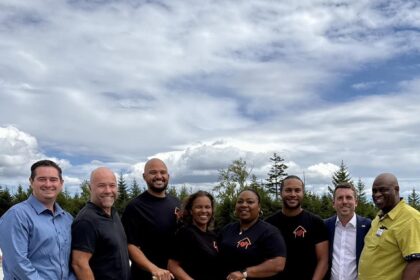There are calls for a major overhaul of the Federation of Sovereign Indigenous Nations, the day after Indigenous Services Canada released an audit summary of FSIN spending. Saskatoon Tribal Council Chief Mark Arcand was joined by chiefs and council members at a news conference to call for more accountability and transparency from the FSIN after the audit which found $34M in questionable, ineligible or unsupported expenditures. Calling it “a tough subject for First Nations people” Arcand said the Chief and Vice Chiefs at FSIN have had the first draft of findings since June 19. “As part of treasury board, we are not included. Due to the convention act at the direction of our chiefs and assembly, we are responsible for all financial matters. But we weren’t invited by the chair of the treasury board, and that chair is chief Bobby Cameron,” Arcand said. He noted that the report shows the “breaking of internal policies and procedures.” “As the chiefs of the rights holders in in all of our seventy four nations, they need to know why that is happening. But again, I’ll stress. Nobody is telling our leadership why this is happening,” Arcand said. “And when we think about the organization, we think about the people. This money belongs to the people, to the grassroots people. It’s there to make a difference in people’s lives.” Noting that the FSIN doesn’t have its own-source funding, but relies on funding agreements with Indigenous Services Canada, Arcand said the only way to rebuild trust is “by being honest.” “At the end of the day, my recommendation to the people, We need accountability. We need transparency immediately…,” “ we should have be having emergency meetings right now to implement these recommendations to improve the credibility of the FSIN, the long standing history that has been there to advocate for treaty and inherent rights for our First Nations people across Saskatchewan.” The Federation of Sovereign Indigenous Nations (FSIN) has roots in the early 20th century. It was preceded by the League of Indians of Canada, according to its website, which was followed by the League of Indians of Canada and the Union of Saskatchewan Indians forming in the 1930s and 1940s to protect First Nations rights and sovereignty. “The organization was officially founded in 1958 as the Federation of Saskatchewan Indians (FSI), evolving into a true federation with formal control over First Nation government in 1982,” the website said. In 2016, it officially changed its name from the Federation of Saskatchewan Indian Nations to its current form “to better reflect its role as a sovereign entity.” Tribal Chief Mark Arcand of the Saskatoon Tribal Council called a news conference Friday to call for transparency and accountability at FSIN. Photo: Leanne Sanders/APTN Arcand implied the audit’s findings may be only the tip of the iceberg. “When we talk about this forensic audit, it’s five years. They’ve only done x amount of samples. We’ve all seen the numbers. You can quote those samples…,Imagine if they did the entire organization of five years in other areas. How much that number could potentially grow?” Arcand said, calling it “mismanagement of the corporation. “ The largest portion of questionable spending related to funds the FSIN received to provide for its citizens during the COVID 19 pandemic. According to the summary from ISC, expenditures were categorized as questionable in the amount of $23,451,907.” That’s because ISC wasn’t able to get complete supporting documentation to determine eligibility. “The FSIN is not above the rules,” Arcand said. “They are not above policy and procedure. They probably did some good things. We have to recognize we’re all underfunded as First Nations organizations. We know that. Right across the board, housing, education, everything, infrastructure in our communities, schools, we’re all underfunded, post secondary. It’s a reality, but it doesn’t mean we have the authority to break the rules. We have to comply. And this is how serious it is to me as a representative of this organization that we hold up to a high standard.” And Arcand said troubling activity continues at FSIN. “They have policies in place, a sponsorship policy. In this policy it says, the following are not eligible for sponsorship. Donations, gifts, funerals, adult team sports, and organized events, adult fundraising, non First Nation initiatives and projects, requests from individuals campaigning for political or quasi political office, conference registrations and other related expenses, pool or billiards tournaments, sweats, powwows, round dances, hunting activities, clothing, gas and hotel and other travel expenses. It says in our document, it’s not eligible. But we’ve continued to fund these things. So who’s breaking policy?” Arcand said he and the rest of the treasury board members did not receive information on sponsorship spending until January of this year. He pointed to a document showing that FSIN approved $50,000 for a horse race this year, saying it’s “still breaking policy. It’s ineligible. But who’s holding them accountable? Somebody’s making these bad decisions inside, and we have to get to the bottom of this. This is where the rights holders come in, the chiefs and assembly,” Arcand said. “That’s how you gain support, giving out sponsorships, handing out TVs, preying on people’s poverty. That’s how you gain support,” Arcand alleged. “That is wrong. Just because your left hand is giving out contracts, sponsorships, and TVs does not give your right hand the entitlement to put money in your pocket, and that’s what’s going on,” he said. Arcand called on Canada to do better. “And at what point do the RCMP get involved? At what point do the RCMP say, we’ll take it from here? How much more dollars do we need to find out? What we are wanting is answers from the executive. Their silence speaks volumes,” Arcand said. “Maybe if we were to give them an honorarium and travel, they would show up, or maybe they’re too busy planning their disappearance. We don’t know. But we’re here to say that we want answers.” Chief Jonathan Pasap of White Bear First Nation spoke at a news conference on the FSIN audit.Photo: Leanne Sanders/APTN Jonathan Pasap, chief of White Bear First Nation in Treaty four Territory said what’s happening at the FSIN affects every Saskatchewan First Nation. “Our FSIN is a non-profit organization with a mandate to protect the treaty. Right now this has lost, this mandate. As a rights holder, this makes things even more difficult for our nation to protect the treaty, to protect our inherent rights for self determination. Our non profit corporation is dividing us. It’s dividing all of us as rights holders. And this is not their purpose.” Pasap said the duty of care and the fiduciary duty is the responsibility of the elected officials. “Our ceremony and culture teaches us to lead with humility and kindness. I respect the titles of the elected officials, but it’s time for them now to speak. Elected FSIN officials, this is your chance to start the discussion,” he said. “Going forward, complete corporate and governance reform is needed. More oversight. The mandate to protect the treaty needs to be reinforced.” Arcand said the issue can’t wait until the FSIN General Assembly in October. “We need to start the conversation now. We need to have the discussion now.” “We have to look at things in a different lens and say, we can’t go through this anymore. Because this is probably one of the biggest scandals in First Nations history. And it’s happening in Saskatchewan? That’s not acceptable. It’s not right,” he said. James Smith Cree Nation Chief Kirby Constant spoke at a news conference on the FSIN audit Friday in Saskatoon. Photo: Leanne Sanders/APTN The chief of James Smith Cree Nation, Kirby Constant called the forensic audit “a start.” “The report is, not the full story. It’s just a sample of what’s been going on in FSIN. But even that in that narrow scope, the results are still unacceptable. FSIN has not even followed its own rules and policies…” “I just wanna say this is this is not, this is not what our past leaders envisioned. When they built these organizations, being from James Smith, the home of Indian government, this is the same logo FSIN uses as James Smith Cree Nation,” Constant said, holding up a beaded medallion. “And today, I stand here feeling shame because FSIN is using this this logo as their own because it’s supposed to show respect and honesty and humility. So with that, I wanna say that, James Smith is disheartened on behalf of my members.” James Smith is also undergoing a forensic audit over what Constant says was a deal the nation’s past leadership made with the FSIN. “I’m still working on the facts of it. Even after eighteen months, I still don’t have the answers that I’m looking for from the government of Canada and from FSIN and how that transpired.” “All I know is FSIN received six point five million on behalf of James Smith Cree Nation’s name and transferred out four point five million to another account, a numbered account for purchase of PPE during COVID time. And how that PPE was dispersed, there was still no report other than a picture of PPE being delivered with numbers of masks, which is very unacceptable on my part,” Constant said. Bob Merasty, former chief at Flying Dust First Nation, and former FSIN vice chief says it may be time to clean house. Photo: Leanne Sanders/APTN A former FSIN vice chief, Robert Merasty who served in 2017, said FSIN should go back to its roots, “and that’s to protect our inherent treaty rights.” “Confidence in this leadership is gone. We need accountability, transparency, and return to the principles of integrity, the way our ancestors envisioned,” he said. “The RCMP must come in and do an absolute complete thorough investigation here. To us, that is what must happen to hold ourselves accountable as leaders, former leaders. We have to be accountable to our people. That investigation has to happen,” Merasty said. ”It’s time to clean house, honestly. These people cannot continue to have that division amongst our nations that’s happening. Their continued role as executive will continue this division and disunity amongst our people, amongst our nations.” Desiree Drever a young band councillor from the Mistawasis Nehiyawak First Nation called for transparency from the FSIN board of directors. “…those terms like accountability and transparency and honesty and ethics guide me. And it’s what I use to sit at my table to fight for policies and practices that ensure we can be accountable and stand in front of our members and answer these hard questions,” she said. Drever said the actions of the FSIN have “set us back as Indigenous people.” “And unfortunately, we as indigenous people fight every single day against racism, discrimination, policies that make us prove and reprove our worth just to get funding…” “Just when we get a little bit ahead, something like this happens. And so I myself, I need those people who made the decisions that contributed to the findings of this audit that, you know, have that courage, step forward, apologize, own up to your mistakes or your choices, be accountable.” Arcand expects the audit will be the number one topic at the upcoming October FSIN assembly in Yorkton, Saskatchewan. He says the FSIN leaders “don’t have a choice. I think they’re going to have to address this because…, we don’t know if ISC is gonna fund them. We don’t know that answer.” Indigenous Services Canada said in a statement emailed to APTN on Wednesday it “will take action on the (audit) findings and recommendations. We are carefully considering next steps, and will consult with any appropriate authorities as required,” said an ISC spokesperson. Tags: Accountability, discrimination, Federation of Sovereign Indigenous Nations, FSIN, Indienous Services Canada, investigation, ISC, Leadership, Racism, RCMP, Saskatoon Tribal Council, STC, Transparency Continue Reading
Its time to clean house at Federation of Sovereign Indigenous Nations according to a former Vice Chief in wake of forensic audit

Leave a Comment










